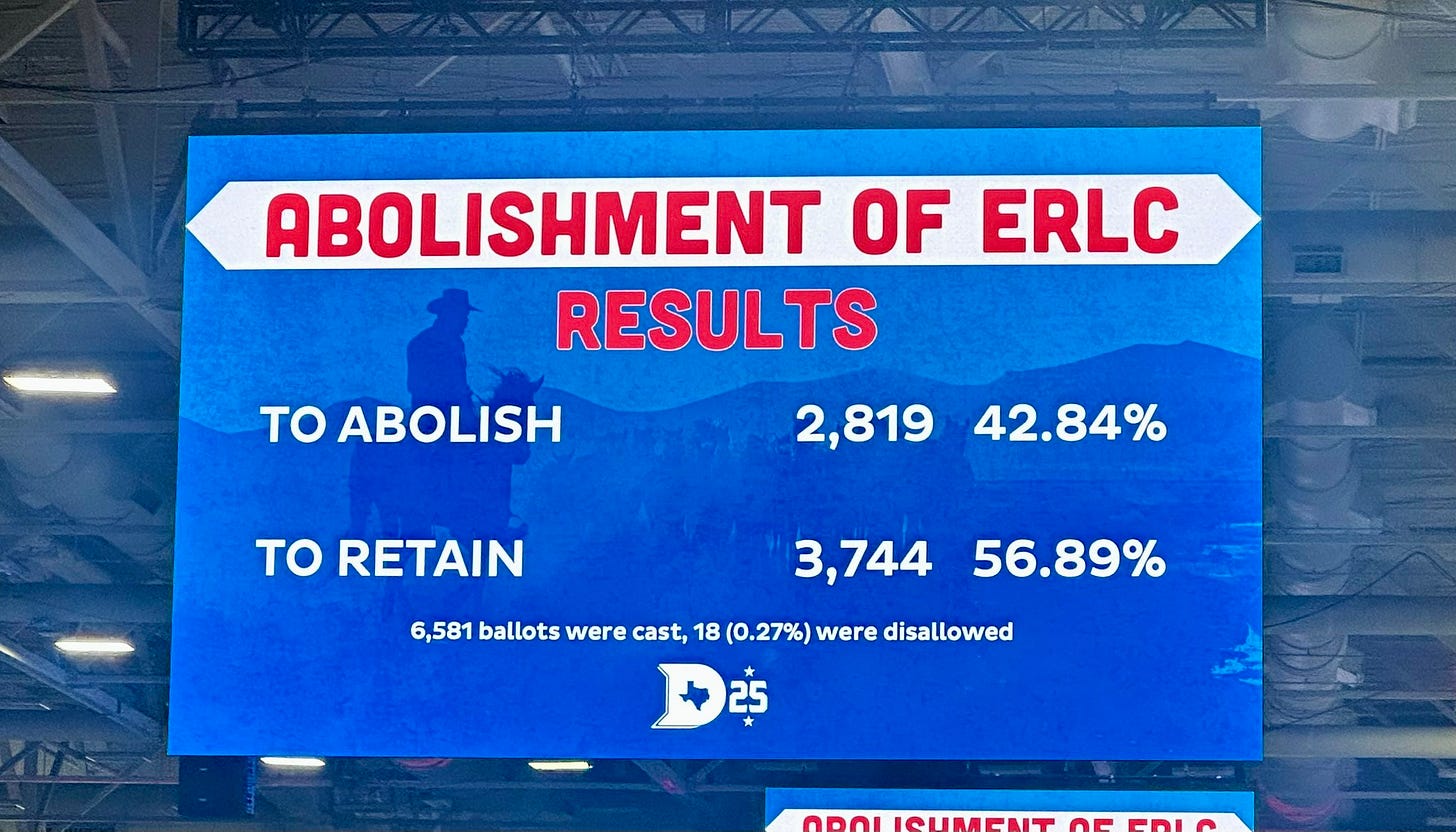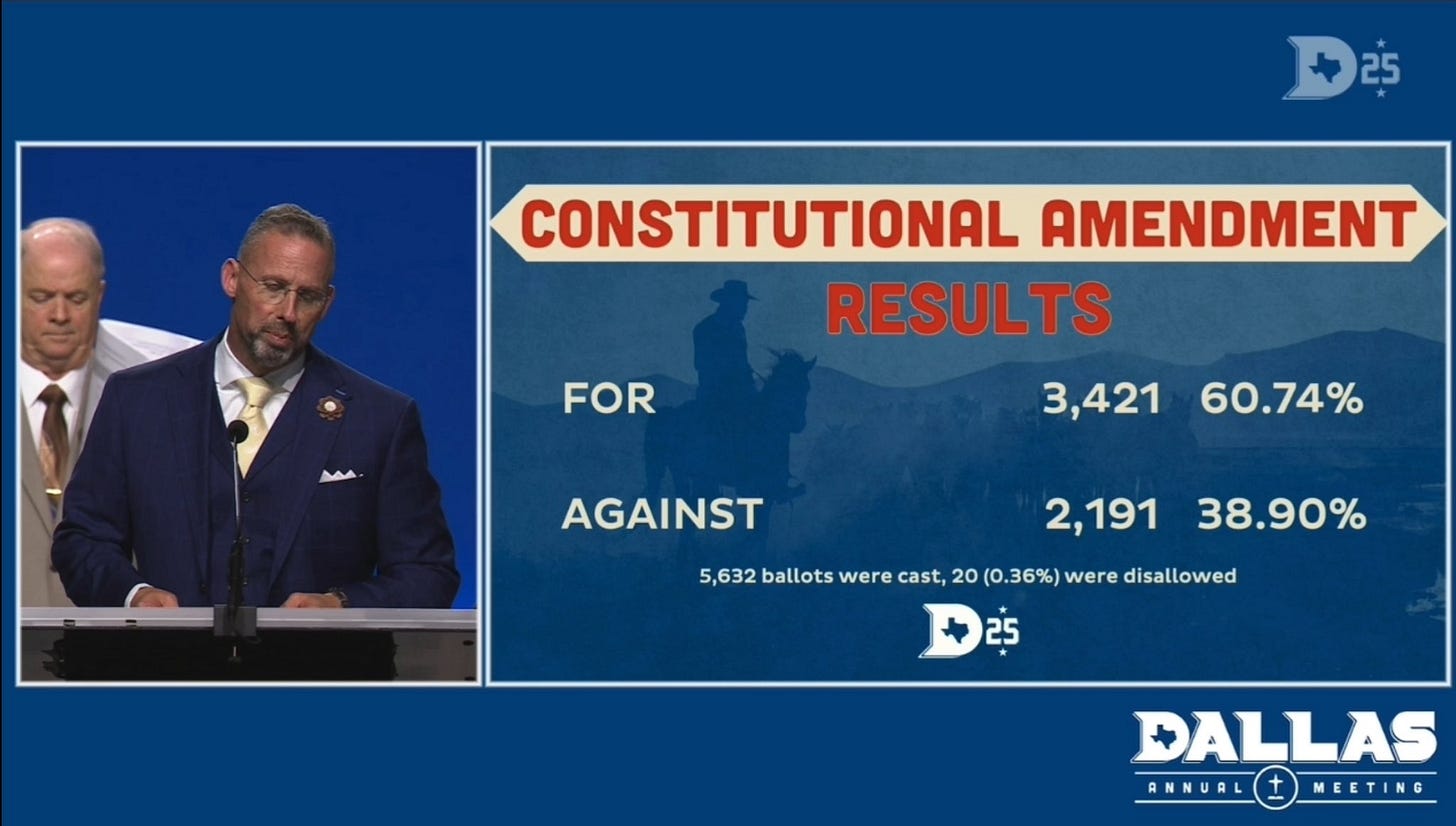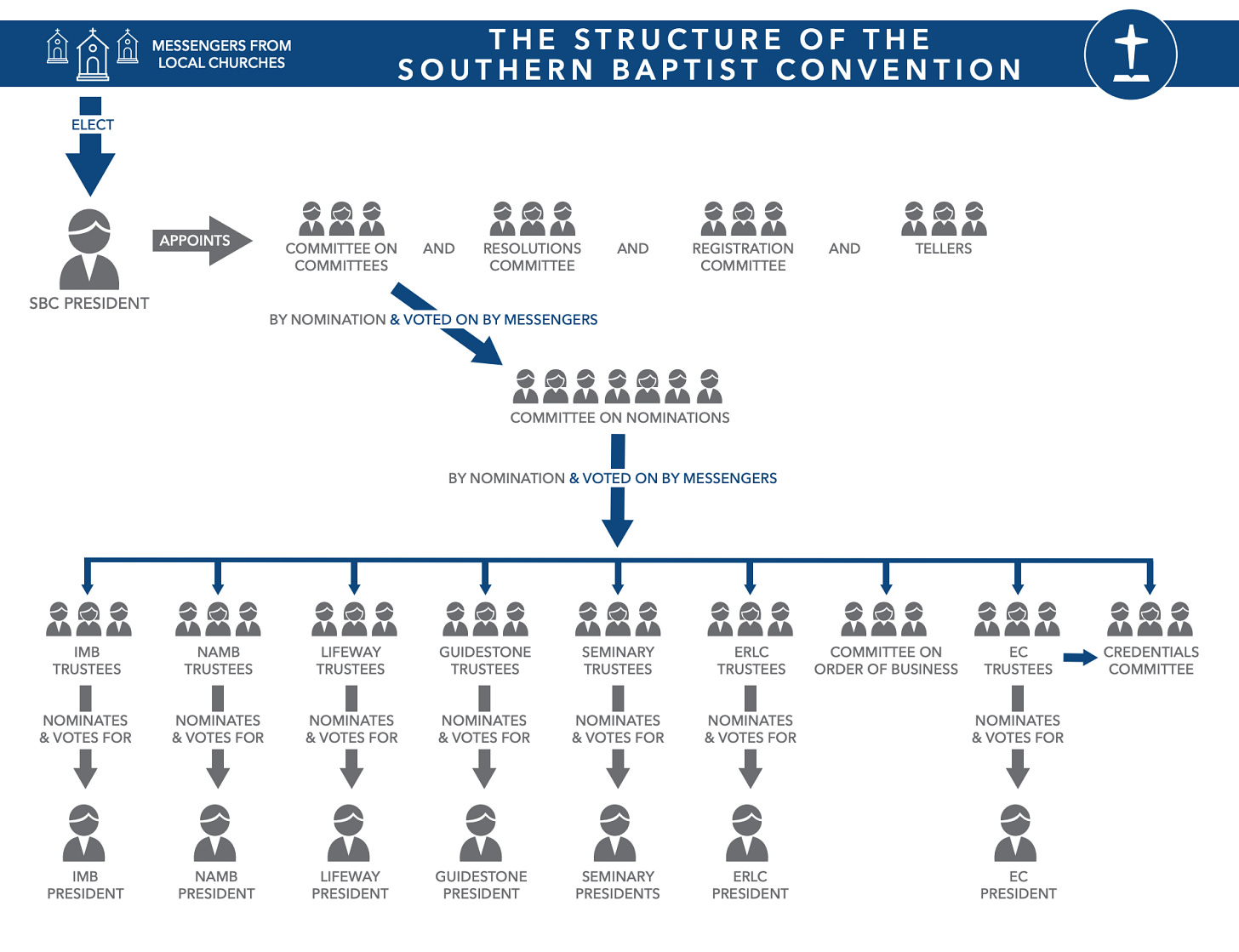Beyond Dallas: The Road Ahead for Southern Baptist Reform
A Recap of Three Major Votes and Where We Go From Here
Much has already been said about the 2025 Southern Baptist Convention in Dallas, Texas. So, rather than provide a comprehensive analysis of what happened, I will briefly recap three major votes and then discuss where the SBC Reformers should go from here. If you want to read a detailed analysis of the annual meeting, I suggest you check out Michael Clary’s piece The Status Quo Convention: Six Takeaways from Dallas.
Recap of Three Major Votes
1) Abolish the ERLC
Pastor Willy Rice of Calvary Church in Clearwater, Florida, motioned to abolish the SBC’s lobbying arm, the Ethics and Religious Liberty Commission (ERLC). This motion was notable given Pastor Rice’s previous public defense of the ERLC. Pastor Rice believes it is time to put pressure on the ERLC due to its failure to faithfully represent SBC values in DC and its willingness to partner with Soros-funded groups that openly oppose Christian values.
The vote to abolish the ERLC was conducted on Wednesday morning, the second full day of the business portion of the convention. SBC Bylaw 25 states that an SBC entity can be abolished by a majority vote of messengers at two successive annual meetings. Unfortunately, the vote to abolish the ERLC fell short with just under 43% of messengers voting in favor of its abolition. Yet the fact that this many were dissatisfied enough to vote for its abolishment sends a clear signal to the ERLC trustees that there are serious problems at the ERLC.
2) Financial Transparency
Pastor Rhett Burns of First Baptist Church of Travelers Rest motioned to amend the Executive Committee’s rewrite of the SBC’s Business and Financial Plan to require SBC entities to disclose financial information comparable to what would be disclosed on Form 990. Form 990, which nonprofits are legally required to fill out, provides important information about their mission, programs, governance, finances, and key staff compensation. It includes revenue and expense breakdowns, disclosures on major donors and fundraising, and compliance with tax-exempt requirements. Messengers desire financial transparency in SBC entities for the same reason they desire it in their local church - to ensure proper stewardship of their tithe money.
The vote to amend the rewrite of the Business and Financial Plan was conducted via ballot raise, which means an official count is unavailable. From where I was sitting, the vote seemed to be split about 35-65 in favor of not amending the B&FP. Those arguing against the motion from the floor claimed that disclosing 990-level information would be too time-consuming and that we already have a trustee system in place to ensure proper stewardship. However, as Pastorn Burns laid out in his defense of the motion, since entities already gather information for annual reports and internal audits, filling out the 990 is not much additional work. If this information were disclosed, it would help messengers ensure that trustees focus on keeping entities in line rather than acting like their brand ambassadors.
3) Reaffirm Male-Only Pastorate
Pastor Juan Sanchez of High Pointe Baptist Church in Austin, Texas, motioned to modify Article III of the SBC Constitution, which lists five conditions to be in friendly cooperation with the SBC. Although the Baptist Faith and Message 2000 already acknowledges that the pastorate is limited to men as qualified by Scripture, the SBC Constitution only requires churches to have a faith and practice that “closely identifies” with the BFM 2000 (Baptists are confessional, not credal). The Law-Sanchez Amendment would add a sixth requirement to Article III: churches can only be deemed to be in friendly cooperation if they affirm, appoint, or employ “only men as any kind of pastor or elder as qualified by Scripture.” This would provide clarity on an issue of scriptural authority being actively challenged by many SBC churches.
The vote to reaffirm a male-only pastorate in the SBC was conducted on Wednesday afternoon, the second full day of the business portion of the convention. Article XIV of the SBC Constitution states that amendments to the SBC Constitution must be made by two-thirds of the messengers voting at two consecutive annual meetings. Unfortunately, the motion fell short of the two-thirds requirement, coming in at about 61%. Those opposed to the Law-Sanchez Amendment are convinced it is unnecessary because the BFM affirms a male-only pastorate, but the Credentials Committee’s refusal to take action against New Spring Church shows it lacks the clarity it needs to evaluate whether or not a church is in friendly cooperation with the SBC.
Where Do We Go From Here?
The voting did not go our way for those of us who see major problems in the Southern Baptist Convention. So, where do we go from here? Do we throw in the towel and give up on the convention, or do we regroup and try again next year?
Considering the Southern Baptist Convention is the largest, most conservative Protestant denomination in the country and a powerhouse for the Kingdom of God through its various entities, it would be foolish to throw our hands up and cede it to those who will drive it into the ground. This is not the first time the SBC has gone through major turmoil, and it won’t be the last. Institutions will inevitably suffer from weak leaders and mission drift from time to time. What we need now are courageous churches who will stay and put in the hard work it takes to reform the convention for good and recover our Baptist distinctives.
Although the convention was disappointing in many ways, we can take solace in the fact that momentum is on our side. People are increasingly waking up to the SBC’s theological drift, and these issues are not going away anytime soon. However, trying the same votes and campaign strategies repeatedly while expecting different results would be insanity. In light of this, I want to provide some thoughts on what the next steps could look like for those willing to engage in the hard but worthwhile work of reforming the Southern Baptist Convention.
The Key to Reform
The key to any faction reforming the SBC (including the Conservative Resurgence of the 1980s) lies primarily in winning the SBC Presidency for many consecutive years. The SBC President appoints the Committee on Committees, which nominates the Committee on Nominations, which nominates entity trustees who, in turn, nominate entity presidents. Since entity presidents do not have term limits, the most viable route to new entity leadership is for the boards of trustees to remove their presidents. This process allows for a complete reshaping of SBC leadership and institutional culture within a decade.
The Keys to the Key: Education and Mobilization
If winning the presidency for consecutive years is the key to reforming the SBC, the keys to the key are education and mobilization.
First, we need to find the best ways to educate Southern Baptists on the problems besetting the Convention and why returning to our Baptist distinctives is the best way forward. Fortunately, there are plenty of people who have stepped up to the plate to educate Southern Baptists, including Founders Ministries, Christ Over All, and, of course, the Center for Baptist Leadership.
As far as education is concerned, we need to focus on how to increase our reach. How do we reach pastors/laymen who are not on Twitter or the online space? Perhaps it is time to tap into our associational meetings and more traditional methods of communication that were harnessed during the Conservative Resurgence. And how do we convince more Institutionalists to team up with the Reformers to drive change? If the Reformers are going to win the vote for the presidency, we need to forge a strong partnership with those who have decades of credibility in the SBC. Reformers often have fresh eyes to see the problems but could benefit from the Institutionalists’ knowledge and relationships. This alliance provides a wonderful opportunity for SBC statesmen such as Albert Mohler to cement their conservative legacy and for others to help the SBC course correct before they find themselves on the wrong side when it is too late.
Second, we need to focus on mobilizing Southern Baptists. When we Reformers have the time and space to make our case, our arguments win the rank-and-file 90% of the time. However, the difficulty in executing SBC reform lies in the home-field advantage of the SBC Establishment. Since many who work for the SBC entities are required to attend the convention or could have their trip paid for, it is much easier for the Establishment to mobilize its base. If you add up all the SBC entities’ employees, their families, and their churches, you could well have a few thousand voters in attendance with strict allegiance to the Platform, to business as usual. With attendance hovering around 10,000 in recent years, even a built-in advantage of 3,000 votes becomes a major impediment to enacting large-scale changes, especially when votes require a two-thirds majority.
Despite the Establishment’s built-in advantage, the Reformers came incredibly close to enacting our preferred changes. If you analyze the two major motions with a ballot count that fell short this year, you can see we only needed to mobilize a few hundred more people from our side to win those votes. For the vote to abolish the ERLC, we only needed to mobilize 925 additional messengers, and for the Law-Sanchez Amendment, 961 additional messengers.
Furthermore, since we know only 7% of SBC churches are sending anyone in the first place and most churches send fewer messengers than they qualify for, we should be incredibly optimistic about the potential to recruit the messengers we need to change the convention.
That begs the question: how do we get more messengers to the Convention? How do we change the incentive structure so that church members want to go to the convention? Much work remains to be done on this question, but I want to present two ideas here.
1) Tap into Local Associational Meetings
Those passionate about SBC reform should consider attending local associational meetings or networking with said associations throughout the state where the next Convention will be held. Focusing on educating the pastors and laymen of these churches could be the most juice for the least amount of squeeze since churches within driving distance of the convention are far more likely to attend.
Take next year, for example. The 2026 Southern Baptist Convention will be held in Orlando, Florida. Florida alone boasts over 2,000 Southern Baptist churches. If the Reformers only need about 900 extra messengers mobilized to the Convention, what better place to start than with these 40+ associations representing 2,000+ churches throughout the state of Florida? Again, only 7% of churches are sending messengers, and most churches are not sending as many messengers as they qualify for. Which brings me to a second idea.
2) Launch a Cooperative Program Stewardship Fund
Aside from the problem of not being educated about the SBC, many pastors and laymen do not go to the annual meeting because of the cost of attendance. Once you add up flights, hotel, food, etc., you could well be spending over $500 to attend the Convention. But what if churches decided to take some of the money they are giving to the Cooperative Program and put it aside as a travel stipend for their members to be messengers at the Convention? It’s hard for people to cough up $500 to attend the Convention, but if churches even partially covered the cost, attendance could significantly increase.
A Cooperative Program Stewardship Fund is easy to enact because it does not require your church to bring in any more money. Furthermore, the CP Stewardship Fund is effective for two main reasons. First, it ensures that your church uses its voice at the Convention to ensure CP money is being stewarded well. Second, it applies pressure for messengers to enact reforms as total CP giving (slowly) decreases. If churches are not comfortable decreasing their CP giving, they could consider raising special funds for travel stipends or commit to covering a particular part of travel costs (ex: flights).
There are many more conversations to be had about how to most effectively reach and mobilize Southern Baptists to engage in Convention reform. The trek ahead of us is long and difficult, but we trust in the One who is in control of all things. He calls us to simply listen to His voice and trust Him. So, let us be faithful in contending for a better SBC and trust the Lord with the outcome.








